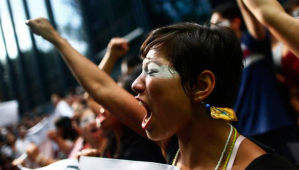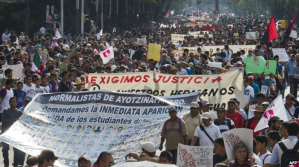
Forty three students, missing from Iguala, Guerrero in Mexico, are presumed dead despite the government's claim that there is a lack of evidence in the case. Seventy-four people are now in custody for their alleged involvement in the students' kidnapping, including the mayor, his wife, and members of the local police force, in what is being called the worst case of human rights violations in Mexico in nearly 50 years.
The students went missing on Sept. 26 after being kidnapped while traveling to participate in protests commemorating the military massacre of students in the capital square of Tlatelolco in the days prior to the 1968 Olympics.
Three members of the violent Guerrero Unidos gang, or Warriors United, have confessed to Mexican authorities that they packed the young men so tightly into a dump truck that 15 of them died from suffocation. The remaining students were shot, they said, their bodies burned for 15 hours, and what was left of their remains, bagged or strewn along a nearby river.
On Oct. 4, the first of many clandestine graves was discovered around Iguala, but none of the remains were determined to be those of the missing first year students. Recent developments in the case suggest that if they were murdered by the drug cartel the remains of all 43 may never be found.
As Mexican Attorney General Jesus Murillo Karam said in a press conference on Friday, many of the remains that those in custody led authorities to were so badly burned that an identity cannot be determined. Murillo Karam answered questions for more than an hour as he relayed gruesome details.
"They threw them to the lower part of a landfill to burn bodies. They stood watch to make sure the fire would last hours putting diesel, petrol, tires, wood, plastic and other elements they found in the area," he said.
At the end of the meeting, and following a video showing authorities gathering bone and teeth fragments, Murillo Karam said, "Ya me canse," or "I've had enough." His three words ignited outrage across the country, where #YaMeCanse and #estoycansado, or "I'm tired," began trending on Twitter.
The attorney general's comment and what is perceived to be a lack of concern by the government, escalated protests, and sparked the burning of the wooden door of the ceremonial presidential palace in Mexico City. Anger over the kidnapping and the government's handling of the case fueled protestors all over the gang ravaged country.
Federal authorities did not launch an investigation until 10 days after the kidnappings.
"It's unacceptable that someone should try to use this tragedy to justify violence," said President Enrique Peña Nieto, while waiting to board a plane in Anchorage, Alaska. "You can't demand justice while acting with violence."
But the president himself is under fire for the handling of the kidnapping, as well as for his decision to travel to China rather than deal with gang violence that has ravaged Mexico for years.
Just one month ago, the president spoke of justice for the kidnapped young men.
"This is infuriating, painful and unacceptable," he said in a televised address to the nation.

Elected in 2012, he promised to reduce the cartel killings in Mexico, and also focus on the economy. Many in the troubled country do not believe he has taken the war on crime seriously, and has shifted his sole focus to Mexico's business interests.
"This event reminds us that crime continues to have a very strong presence in certain parts of the country," said Ana Maria Salazar, a member of the Council on Foreign Relations, and an expert on international law and national security in Latin America. "They're very much linked to politics and politicians."
Prosecutors have accused José Luís Abarca, the mayor of Iguala, who fled just days after the incident, and his wife, Maria de los Angeles Pineda, with ordering the arrest of the students.
Corrupt local police, allegedly in the pockets of the drug cartel just like the mayor, ambushed the students on those orders. Unarmed and unable to escape quickly enough, six students were killed on the spot. The remaining 43 were handed off by police to members of the Guerrero Unidos.
One trainee teacher, 19-year-old Julio César Mondragón, attempted to flee on foot.
Mondragón's body was found the following day, dumped on a busy street, his skin peeled off and his eyes gouged out - the calling card of drug cartel killers.
For a country known for corruption, police brutality and oppression, the alleged mass murder continues to induce outrage across the nation. Many of the students attending the small college - about 100 miles south of Mexico City - come from the farming hills of Guerrero, and have been forced to live in impoverished conditions due to corrupt government officials, murderous drug lords, and the harmful vigilante groups that have risen up.
According to the Associated Press, graduates of the Ayotzinapa Teacher Training College and others in the school system are guaranteed teaching jobs that pay just $500 a month at schools often reachable only on foot.
For Jose Luis Romero, attending the school was an opportunity to improve his life and earn money to support his six siblings and his mother, now a widow.
"He said: 'Mom, I'm going to study, to try to get ahead. Don't you see, now that my dad's dead I have to do something,' " his mother, Macedonia Torres Romero, told the AP.
While the total number of homicides declined by 15 percent during Peña Nieto's first year in office, Guerrero state is still suffering from a homicide rate of 61 per 100,000 inhabitants. And though 98 percent of murders went unsolved nationwide last year, parents of the missing students are still clinging to the hope that their sons will return home safely.
"We want results but with evidence," said the mother of one missing student. "The moment that we as relatives have the certainty that what the attorney general says is true then we will accept the result. Whatever it is."







